“Ins” and “Outs” of CBE in 2024
CompetencyWorks Blog
The “ins and outs” of 2024 is a spin on New Year’s Resolutions and a new viral trend. In this CompetencyWorks blog post, we expand on the content discussed in our “Coffee Talk” On February 13th. This analysis of the latest trends shaping CBE and the broader education field highlights what (we hope) is gaining traction (“Ins”) and what (we hope) educators and stakeholders are moving away from (“Outs”).
IN: Providing Opportunities for Student Agency
Long gone are the days of teachers being the only leader in the class – let 2024 be the year we truly recognize it! As represented in the OECD’s Learning Compass 2030, empowering students with the skills and opportunities to use their agency can enable them to develop and showcase competency in essential skills relating to creating new value, reconciling tensions and dilemmas, and taking responsibility. A culture of agency helps young people to thrive and also serves the broader learning community who supports and loves them – we all are more likely to be successful when we feel confident in our abilities to accomplish our goals. Students are whole human beings brimming with potential, and there are many ways you can develop and unleash student agency inside and outside of your learning environment, particularly with the flexibility of a competency-based environment. Agency by Design: An Educator’s Playbook offers a framework and many practical moves to get started. From innovative work-based learning initiatives to meaningful student internships, dive deeper into the world of student agency with us!
OUT: Seat time
We’ve long known that it is time to move beyond the traditional system based on the “Carnegie unit,” which uses the credit hour or “seat time” as a way to measure learning based on the time spent in a classroom. Last year the Carnegie Foundation for the Advancement of Teaching announced it is seeking to rethink the Carnegie unit that it created back in 1906: “It is time to fundamentally rethink how learning progressions and mastery are demonstrated, the methods of measurement used, and how attainment of skills is communicated throughout a learner’s journey.” Carnegie Foundation is pursuing this endeavor through various partnerships including one with our nation’s big testing company, ETS (Educational Testing Services). The collaboration aims to better assess a range of both “academic” and “non-academic” skills needed for success to move away from time-based units of learning.
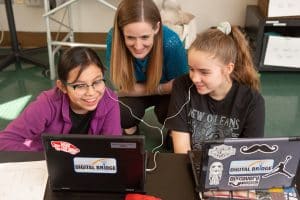
The CBE field embraces assessment models that bolster a wider set of social and interpersonal skills, allow creative ways to demonstrate those skills, and encourage students to work at their own pace. How can the CBE field share what we’ve learned in the past decade and a half to support a true re-envisioning of the Carnegie unit and not swap standardized time for standardized assessment of local graduate profiles? We need modern ways to accurately report and communicate how young people are building knowledge and skills. Let’s help states and the federal government see how they might give local communities the flexibility to define and create their own assessment systems.
IN: Navigating Generative AI
There is a lot of conversation about what to do in education because of artificial intelligence (AI) and fear that traditional teaching styles will not adequately prepare students for an AI-driven future. Additionally, there is fear that AI tools could generate more undetectable methods of academic cheating, undermining our education systems. The CompetencyWorks team is pushing back against these fears in 2024 and advocating for embracing generative AI in your learning environment this year to support more personalized learning opportunities while building towards competency.
AI-powered adaptive learning platforms can help tailor content to specific students’ individual needs, making it more student-centered. When used effectively, AI can provide interactive learning experiences, support quick information retrieval, and enhance writing skills. Tools like ChatGPT can even serve as a tool for educators to access educational resources, create lesson plans, and learn more teaching strategies to set them up for more success (while potentially lessening the load during prep hour)! Let’s embrace AI and build the skills – in ourselves and our learners – to use AI ethically and strategically for good.
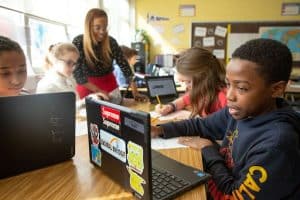
OUT: Using large-scale, high-stakes assessments to track student progress
According to The New York Post’s analysis of New York State Education Department data, “Nearly 200,000 students – or one out of five – refused to sit for the state’s standardized reading and math exams for grades 3-8 administered in the spring” of 2023. Standardized, high-stakes summative assessment practices – especially annual, large-scale tests – have been criticized for a number of reasons for a number of years. However, many school systems continue to use them as a main form of metrics when evaluating student achievement.
Test preparation can end up taking an enormous amount of time in the school day, and can narrow the focus of teaching to subjects that are likely to be tested. While literacy and numeracy are essential, there are many other ways to assess these skills. States, districts, and schools have the opportunity to teach a much broader set of skills than ELA and math. By remaining rigid, American assessment approaches will continue to place emphasis on traditional content knowledge over broader skill sets necessary in today’s increasingly global and complex world.
At the 2023 Aurora Institute Symposium, keynote speaker Alcine Mumby from Envision Learning Partners talked briefly about the history of standardized assessment and its inherent bias, given its roots in eugenics. We may not be able to get rid of this practice entirely in the near-term, even with the “opt-out” movement on the rise till post-COVID-19 shutdowns. Even so, in 2024, we’re suggesting using them to validate our local systems of assessment rather than using them as a one-size-fits-all to track student performance and judge school quality.
IN: Local assessment systems
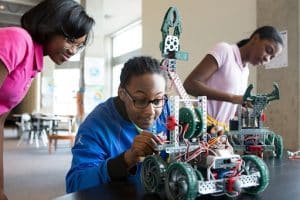
In the EdWeek article, What 2024 Will Bring for K-12 Policy: 5 Issues to Watch, Libby Stanford names “Rethinking Measures of Success.” At least 17 states have created a Portrait of a Graduate envisioning a broader definition of success for students that centers essential skills and dispositions. Local assessment systems that allow students to develop, demonstrate, and get feedback on these skills and dispositions – which can feel harder to measure – are the next step in making the vision of a PoG a reality for students. Student performance assessment allows students to show what they know in relevant, rigorous ways and provides data that help students, teachers, and families to know where students are in their learning. When local assessment systems are strong and educators are supported to develop assessment literacy to create, assess, and calibrate evidence of learning, large-scale standardized tests shift from being the definitive judgment of how we are doing to a way to validate and improve our local systems that are already telling us how students are doing in their learning.
At the federal level, there is a movement to reboot the Innovative Assessment Demonstration Authority. Count us in on contributing energy for designing new assessments that provide relevant information about the learning outcomes we most care about for our students.
OUT: Silos and competition in the field
The organizations working in the field of learner-centered, CBE transformation believe in the moral imperative of changing the student learning experience in our PK-12 education system. Our young people deserve an educational experience that prepares them to thrive in and navigate a dynamic and rapidly changing world. Organizations in the CBE field often collaborate, partner, and engage in field coordination activities, yet an undercurrent of competition remains when it comes to staying relevant and growing business. Let’s shift into a new level of field coordination, coherence, and collaboration moving forward. We know there is more than one pathway to transforming the learner experience. We can help communities understand that flexibility as they shape their vision and goals for their students. Communicating the power of an inclusive and shared vision – and that it is possible to make that a reality for learners – can unleash the demand for learner-centered transformation within the education field and from the broader public. We’ve learned a lot about what works – and what doesn’t – together, let’s build momentum for transformation as a movement of movements.
IN: Equity and Culturally Responsive and Sustaining Education
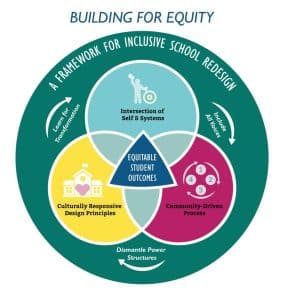
The ultimate purpose for relentlessly pursuing equity is for every student to access an education that helps them to thrive – by using their agency, finding relevant ways to apply what they learn, healing historical inequities, and helping each person know that they matter and that they are seen. Culturally responsive and sustaining education (CRSE) can guide each community to design a system that works for their learners. There is ample room to meet a range of unique needs and preferences while ensuring that everyone’s needs are met. CBE provides a method and set of tools to bring together key practices that create a different student experience than our predominant one-size-fits-all system. Implementing a capstone project, restorative practices, real-world learning, or any number of other learner-centered practices, you know the value of each of those practices in and of themselves. AND, CBE can bring those practices into a coherent, equitable system that has the potential to be better than the sum of its parts.
Join Us
The shift from traditional teaching to more student-centered, competency-based approaches marks a pivotal moment in our commitment to ensuring the full potential of every student. By embracing student agency, rethinking outdated metrics, harnessing the power of generative AI, prioritizing local assessment systems, fostering collaboration in the education field, and championing educational equity, we are paving the way for more inclusive, dynamic, and effective learning environments in 2024.
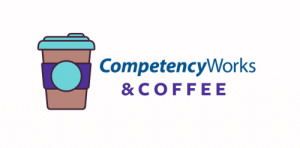 People to discuss these Ins and Outs at our first CompetencyWorks and Coffee interactive webinar on February 13. Here are the headlines from each breakout discussion:
People to discuss these Ins and Outs at our first CompetencyWorks and Coffee interactive webinar on February 13. Here are the headlines from each breakout discussion:
- IN: Student Agency – Agency STRENGTHENS the Instructional Model (But You Gotta Prep!)
- OUT: Seat Time – Moving Away From Seat Time Requires Shifting Will and Shifting/Replacing Structures (Contracts, LMS, SIS, Schedules, etc…)
- IN: Navigating Generative AI – AI is Here to Stay: How Will We Prepare Learners NOW (We Can’t Wait!), With and Through AI?
- OUT: Using large-scale, high-stakes assessment to track student progress – Reimagining and Redesigning Reliable and Valid Assessment Models
- IN: Local Assessment Systems – Balancing Durable Skills and Discrete Knowledge and Incremental Skills
- OUT: Silos and competition in the field – The Status Quo Keeps Us in Our Siloed Patterns – We Need Brave Leaders Who Listen
- IN: Equity & Culturally Responsive and Sustaining Education – “Competency education isn’t equitable enough”
Tag Aurora with your Ins and Outs for this year on Twitter or LinkedIn using #CompetencyWorksChat!
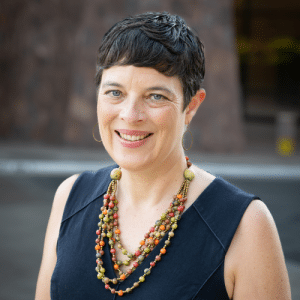 Laurie Gagnon is the CompetencyWorks Program Director at the Aurora Institute. She leads the work of sharing promising practices shaping the future of K-12 personalized, competency-based education (CBE). Prior to her current role, she led learner-centered education design and systems change focused on performance-based assessment and CBE at reDesign and at the Center for Collaborative Education. Laurie began her professional life teaching English in Japan and high school history in the U.S. She lives in Somerville, MA with her partner, young son, and cat. She takes a learning stance in her work and life and believes that building relationships and understanding the perspectives of others offer powerful levers for creating new possibilities.
Laurie Gagnon is the CompetencyWorks Program Director at the Aurora Institute. She leads the work of sharing promising practices shaping the future of K-12 personalized, competency-based education (CBE). Prior to her current role, she led learner-centered education design and systems change focused on performance-based assessment and CBE at reDesign and at the Center for Collaborative Education. Laurie began her professional life teaching English in Japan and high school history in the U.S. She lives in Somerville, MA with her partner, young son, and cat. She takes a learning stance in her work and life and believes that building relationships and understanding the perspectives of others offer powerful levers for creating new possibilities.
 Briana Medina joined the Aurora Institute as an intern with CompetencyWorks in May 2023. She is currently a junior at the University of Wisconsin-Madison studying Political Science and Education Studies. She is committed to educational equity and passionate about its relation to competency-based learning. She currently serves on the UW-Madison College of Letters and Science Curriculum Committee, where she reviews and recommends course and program additions, revisions, and policies relating to academic offerings. In the past, Briana has worked as an intern at Kettle Moraine School for Arts and Performance, giving tours and teaching in a competency-based learning environment. Additionally, she collaborated with the Institute for Personalized Learning leading panel discussions, making presentations, and writing blog posts.
Briana Medina joined the Aurora Institute as an intern with CompetencyWorks in May 2023. She is currently a junior at the University of Wisconsin-Madison studying Political Science and Education Studies. She is committed to educational equity and passionate about its relation to competency-based learning. She currently serves on the UW-Madison College of Letters and Science Curriculum Committee, where she reviews and recommends course and program additions, revisions, and policies relating to academic offerings. In the past, Briana has worked as an intern at Kettle Moraine School for Arts and Performance, giving tours and teaching in a competency-based learning environment. Additionally, she collaborated with the Institute for Personalized Learning leading panel discussions, making presentations, and writing blog posts.